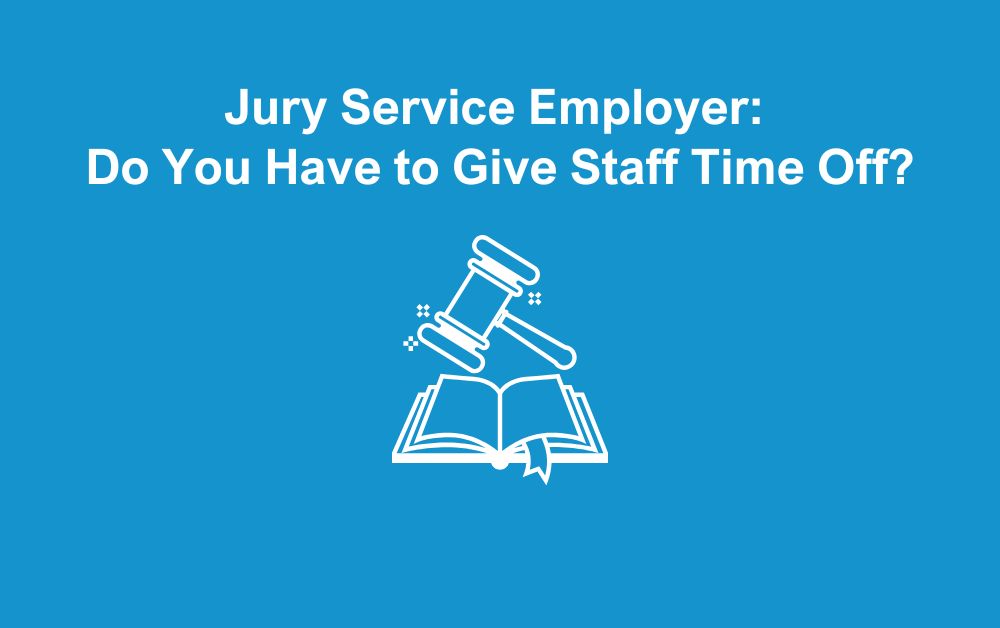Jury service is a civic duty that many employees may be called upon to fulfil during their working lives. As a jury service employer, it’s important to understand your responsibilities when a member of your team is summoned. From navigating time off requests to understanding your legal obligations, this blog will guide you through what you need to know as an employer when your staff are selected for jury duty.
Do I need to give staff time off for Jury Service?
Yes, you are legally required to allow staff time off work if they have been selected for Jury Service. As a jury service employer, you must recognise that this is a civic duty, and employees must be given the time needed to attend. It is important to note that employees must not be treated unfairly, discriminated against, or dismissed because of their need to attend Jury Service. Doing so could give them grounds to bring a claim against you at an employment tribunal. This could potentially resulting in legal and financial consequences for your business.
How long is Jury Service?
Jury service usually lasts for up to ten working days, running Monday to Friday. However, in certain circumstances, it can extend beyond this period. If it becomes clear that a case is expected to go on for longer, the Judge will inform the jurors in advance. At that point, individuals will be given the chance to request to be excused or to defer their service to a later date.
If your employee receives a jury summons, they should inform you as soon as possible so appropriate arrangements can be made. If they attend court but are not selected to sit on a jury, they will be expected to return to work as normal.
Do I have to pay staff during Jury Service?
You are not legally obliged to pay staff while they are carrying out jury service. During this period, the court will cover travel expenses, provide a subsistence allowance, and offer a loss of earnings payment. To enable your employee to claim this, both you and your employee will need to complete a Certificate of Earnings form. This must be submitted to the court on their first day.
At present, the daily loss of earnings allowance is £64.95. Jurors can claim back childcare or care costs, travel expenses, and a daily subsistence payment of £5.71. This is provided to help cover food and drink.
That said, to avoid your employees being financially disadvantaged during jury service, you may choose to continue paying their usual wages as a gesture of goodwill, or offer a rate that exceeds the court’s allowance.
Can I ask the court for this to defer this?
If you believe your employee being out of the office during this time will negatively impact your business, you can request a deferral. This allows their jury service to be postponed to a later date. You will have to write a letter to explain the reasons why. The Jury Duty will then be potentially postponed for up to 1-year. You will have 7 days to get your employee to co-sign the letter and send it to the court. It’s important to keep in mind that deferrals will only be granted under very rare circumstances.
Jury service can be deferred or rescheduled for a number of valid reasons, including:
-
Sitting an exam during this time
-
Pre-arranged life events, such as a holiday or wedding
-
Medical reasons, such as undergoing an operation
-
Recently becoming a parent
In all of these situations, the individual summoned must provide three alternative dates within the next twelve months when they would be available to carry out their jury service.
Jury Duty Policy
To ensure consistency and clarity, it’s good practice to have a clear Jury Duty Policy in place. The policy should outline the process employees need to follow when they receive a summons. This includes how and when to notify their line manager, whether they’ll be paid during their absence, and what documents need to be submitted for court claims.
Your policy should also clarify your approach to pay—whether employees will receive their normal wage, only the court allowance, or a top-up—and explain any requirements around returning to work if they are not selected to sit on a jury. By setting clear expectations from the outset, you can help avoid confusion and maintain transparency across your team.
How We Can Help
Managing unplanned absences like jury service can be tricky, especially for smaller businesses with limited staff cover. At The HR Booth, we can help you create or review your Jury Duty Policy. We can guide you through your obligations as an employer, and support you in managing employee absences with minimal disruption.
If you’re unsure how to handle a jury summons, our team can help. Get in touch for tailored advice and support with this or any other HR challenges.
In Conclusion
Jury service may cause some temporary disruption to your business. However, it’s important to recognise it as a vital part of the legal system. By understanding your responsibilities as an employer and supporting your staff during this time, you’ll stay compliant. You’ll also build trust and goodwill within your team.
If you need help drafting a Jury Duty Policy or managing related HR issues as a Jury Service employer, we’re here to help. Reach out to us for expert guidance every step of the way.







